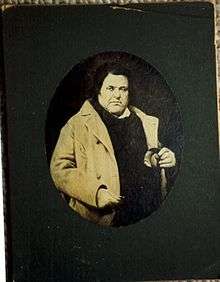William Stanbery
| William Stanbery | |
|---|---|
 | |
| Member of the U.S. House of Representatives from Ohio's 8th district | |
|
In office October 9, 1827 – March 3, 1833 | |
| Preceded by | William Wilson |
| Succeeded by | Jeremiah McLene |
| Personal details | |
| Born |
August 10, 1788 Essex County, New Jersey |
| Died |
January 23, 1873 (aged 84) Newark, Ohio |
| Resting place | Cedar Hill Cemetery |
| Political party | |
William Stanbery (August 10, 1788 – January 23, 1873) was a U.S. Representative from Ohio from 1827 to 1833.
Born in Essex County, New Jersey, Stanbery received an academic education and studied law in New York City. He was admitted to the bar and moved to Newark, Ohio in 1809 where he started a law practice. He was elected to the Ohio Senate in 1824 and 1825. He was elected a Jacksonian to the United States House of Representatives in 1827 to fill the vacancy caused by the death of William Wilson. He was reelected as a Jacksonian in 1828 and as an Anti-Jacksonian in 1830.
During his time in Congress, Stanbery was known to be controversial. In April 1832, Stanbery made accusations about Sam Houston, who was visiting Washington, D.C. at the time, on the floor of the House. He was attacking President Andrew Jackson through Houston and accused him of being in league with John Von Fossen and Robert Rose. The three men bid on the supplying of rations to Indians who were being forcibly removed because of Jackson's Indian Removal Act of 1830. Stanbery, now carrying two pistols and a dirk, refused to answer Houston's letters. Infuriated, Houston later confronted him on Pennsylvania Avenue as he left Mrs. Queen's boardinghouse and beat Stanbery with a hickory cane. Stanbery did manage to draw one of his pistols, place it at Houston's chest and pull the trigger, but it misfired.
Congress ordered the arrest of Houston on April 17 who hired Francis Scott Key as his attorney. He pleaded self-defense, but was found guilty in the high-profile trial, however he was only lightly reprimanded thanks to high placed friends, among them James K. Polk. Stanbery then filed charges against Houston in civil court. Judge William Cranch found Houston liable and fined him $500 which he never paid before leaving for Mexican Texas.
On July 11, 1832, Stanbery was censured by the House of Representatives for saying of House Speaker Andrew Stevenson that his eye might be "too frequently turned from the chair you occupy toward the White House." Stanbery was defeated for renomination in 1832. Afterwards, he resumed practicing law in Newark where he died on January 23, 1873. He was interred in Cedar Hill Cemetery.
William Stanbery's brother Henry Stanbery served as United States Attorney General under Andrew Johnson and resigned to defend Johnson during his impeachment trial.[1][2]
References
- ↑ Rowland H. Rerick, History of Ohio, 1902, page 249
- ↑ William B. Neff, Bench and Bar of Northern Ohio, 1921, page 100
External links
- United States Congress. "William Stanbery (id: S000788)". Biographical Directory of the United States Congress.
- George Mason University's History News Network
- William Stanbery at Find a Grave
| United States House of Representatives | ||
|---|---|---|
| Preceded by William Wilson |
Member of the U.S. House of Representatives from Ohio's 8th congressional district October 9, 1827 – March 4, 1833 |
Succeeded by Jeremiah McLene |
![]() This article incorporates public domain material from the Biographical Directory of the United States Congress website http://bioguide.congress.gov.
This article incorporates public domain material from the Biographical Directory of the United States Congress website http://bioguide.congress.gov.
